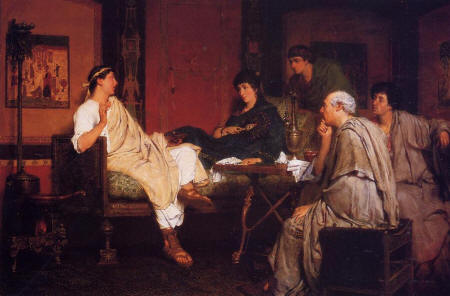

 Albius Tibullus (c. 55 BC – 19 BC) was a Latin poet and writer of elegies. His first and second books of poetry are extant; many other texts attributed to him are of questionable origins.
Little is known about the life of Tibullus. There are only a few references to him by later writers and a short Life of doubtful authority. Neither his praenomen nor his birthplace is known, and his gentile name has been questioned. His status was probably that of a Roman eques, and he had inherited a considerable estate. Like
Virgil, Horace and Propertius, he seems to have lost most of it in 41 BC in the confiscations of Mark Antony and
Octavian.[1]
Albius Tibullus (c. 55 BC – 19 BC) was a Latin poet and writer of elegies. His first and second books of poetry are extant; many other texts attributed to him are of questionable origins.
Little is known about the life of Tibullus. There are only a few references to him by later writers and a short Life of doubtful authority. Neither his praenomen nor his birthplace is known, and his gentile name has been questioned. His status was probably that of a Roman eques, and he had inherited a considerable estate. Like
Virgil, Horace and Propertius, he seems to have lost most of it in 41 BC in the confiscations of Mark Antony and
Octavian.[1]
The three poems centered on Marathus constitute the longest poetic project in Roman literature having homosexual love as theme.[6] The first of these poems, 1.4, begins with an imprecation of the poet to the god Priapus, asking for advice on how to win over beautiful boys. The god advises patience and that the man in love yield to the beloved boy's every whim and perform a series of services if the boy demands it (1.4.15–53). At first the narrator of the poem presents himself as someone who is simply asking for advice from the god on behalf of a friend who fell in love with a boy but whose wife forbids such affairs (1.4.73). He later portrays himself as a teacher in the affairs of love, declaring that the doors of his house are open for other men in love with boys to ask his advice (1.4.78). In the end lines, however, he confesses to loving a boy named Marathus, who tortures him with "love's delay" (1.4.81) and whom the narrator can not conquer with his arts, causing other men to laugh at his lessons (1.4.83).
Tibullus died prematurely, probably in 19,[2] and almost immediately after Virgil. His death made a deep impression in Rome, as is clear from his contemporary, Domitius Marsus, and from the elegy in which Ovid[3] enshrined the memory of his predecessor.[1]
My published books: